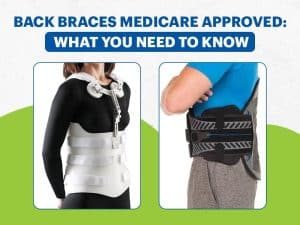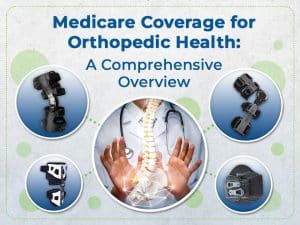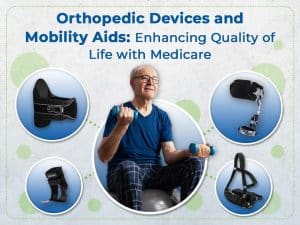Orthopedic health is essential for maintaining mobility and overall well-being, especially as we age. For many seniors, Medicare covers various orthopedic-related services and treatments. This comprehensive overview will delve into Medicare coverage for orthopedic health. From joint surgeries to mobility aids, we’ll explore how Medicare can support you in your orthopedic healthcare journey.
Understanding Medicare’s Role in Orthopedic Health
Before delving into the specifics of Medicare coverage for orthopedic health, it’s essential to grasp Medicare’s broader role in supporting the well-being of older adults and individuals with specific disabilities. Medicare is a federal health insurance program primarily designed for individuals aged 65 and older. It also extends its coverage to younger individuals with specific disabilities. While Medicare’s coverage encompasses various aspects of healthcare, its role in orthopedic health is particularly vital due to the prevalence of orthopedic issues among seniors.
Comprehensive Healthcare for Seniors
Medicare is a lifeline for seniors, offering comprehensive healthcare coverage that addresses various medical needs. As individuals age, orthopedic health concerns become more common, making Medicare an invaluable resource for older adults seeking orthopedic care. This includes coverage for conditions affecting bones, joints, muscles, and connective tissues.
Addressing Orthopedic Conditions
orthopedic conditions include osteoarthritis, rheumatoid arthritis, fractures, sprains, and musculoskeletal disorders. These conditions can significantly impact an individual’s mobility, independence, and overall quality of life. Medicare’s role in orthopedic health involves providing coverage for diagnostic services, treatment options, and necessary medical equipment and supplies to manage these conditions effectively.
Coverage for Medical Procedures
Medicare offers coverage for various medical procedures related to orthopedic health. This includes surgical interventions such as joint replacements, fracture repairs, and orthopedic surgeries. The coverage extends to inpatient and outpatient services, ensuring that individuals receive the necessary care, whether a complex surgical procedure or a less invasive treatment option.
Rehabilitative Services
Orthopedic care often involves rehabilitation to regain strength, mobility, and function. Medicare covers rehabilitative services, including physical therapy, occupational therapy, and rehabilitation facility stays. These services are essential for individuals recovering from orthopedic surgeries or injuries.
Medical Equipment and Supplies
Many orthopedic conditions require specialized medical equipment and supplies to aid mobility and daily living. Medicare covers durable medical equipment (DME) such as wheelchairs, crutches, braces, and mobility aids when prescribed by a healthcare provider. This ensures that individuals can access the tools they need to manage their orthopedic conditions effectively.
Holistic Orthopedic Care
Medicare recognizes the importance of a holistic approach to orthopedic care. This includes medical interventions, preventive measures, patient education, and ongoing management of chronic orthopedic conditions. By promoting comprehensive orthopedic health, Medicare aims to enhance its beneficiaries’ overall well-being and quality of life.
Orthopedic Surgeries and Medicare Coverage: Regaining Mobility and Alleviating Pain
Orthopedic surgeries can be transformative, offering individuals the opportunity to regain mobility and alleviate debilitating pain caused by musculoskeletal conditions. Recognizing the importance of these surgical interventions, Medicare provides coverage for various orthopedic procedures. This coverage encompasses surgeries to repair fractures, address joint issues and improve musculoskeletal health. However, specific criteria must be met to ensure eligibility for Medicare coverage.
Joint Replacement and Medicare: A Path to Enhanced Mobility
Joint replacement surgeries, particularly hip and knee replacements, are frequently performed as orthopedic procedures, especially among seniors. These surgeries promise to restore mobility and relieve pain, significantly improving an individual’s quality of life. Medicare acknowledges the significance of joint replacement and typically provides coverage for such procedures.
To benefit from Medicare coverage for joint replacement surgeries, certain conditions must be met:
- Medical Necessity: Medicare requires clear documentation of the medical necessity of the joint replacement procedure. This documentation ensures that the surgery is not elective but essential for the individual’s health and well-being.
- Medicare-Approved Provider: It is essential to choose a healthcare provider or facility approved by Medicare. Ensuring that a Medicare-approved provider performs the surgical procedure is crucial in securing coverage.
- Coverage Breakdown: Medicare coverage for joint replacement surgeries involves multiple components. Generally, Part A of Medicare covers the hospital stay, including the surgery and related inpatient services. Meanwhile, Part B covers the physician’s services and necessary medical supplies. Understanding this coverage breakdown is essential for individuals undergoing joint replacement procedures.
Orthopedic Devices Approved by Medicare: Supporting Mobility and Functionality
Orthopedic devices are invaluable in the journey to orthopedic health. They provide essential support and mobility aid and contribute to the overall well-being of individuals with musculoskeletal issues. Medicare recognizes the importance of these devices and may cover approved orthopedic aids, which can include:
- Braces and Splints
- Prosthetic Limbs
- Durable Medical Equipment (DME) like walkers, crutches, or wheelchairs
To ensure Medicare coverage for orthopedic devices, individuals should obtain these aids from Medicare-approved suppliers. This ensures that the devices meet Medicare’s standards for quality and effectiveness.
Consulting Orthopedic Specialists with Medicare: Accessing Specialized Care
Comprehensive orthopedic care often involves consultations with specialists with the expertise needed to address complex musculoskeletal conditions. Medicare generally covers consultations with orthopedic specialists and the diagnostic services associated with these visits.
For individuals seeking orthopedic care covered by Medicare, working with healthcare providers who accept Medicare is advisable. This minimizes out-of-pocket costs and ensures that individuals receive the necessary care and guidance from orthopedic specialists to enhance their musculoskeletal health.
Read More: Maximizing Benefits: How to Make the Most of Medicare-Approved Braces and Devices
Musculoskeletal Health and Medicare
Orthopedic health is not limited to surgical procedures and medical devices; it encompasses the broader realm of musculoskeletal well-being. Medicare recognizes the significance of maintaining and improving musculoskeletal health in individuals, especially as they age. In addition to covering orthopedic surgeries and equipment, Medicare offers support for services that promote overall musculoskeletal wellness, ensuring a comprehensive approach to orthopedic care.
Physical Therapy Services
One of the key components of musculoskeletal health is physical therapy. Medicare provides coverage for physical therapy services, which are pivotal in improving mobility, strength, and functionality. Physical therapists work closely with patients to develop tailored exercise programs and rehabilitation plans for orthopedic conditions and injuries. These services are vital for individuals recovering from surgeries, managing chronic musculoskeletal conditions, or seeking to enhance their overall physical well-being.
Occupational Therapy Services
Occupational therapy is another essential aspect of musculoskeletal health covered by Medicare. Occupational therapists assist individuals who may have been affected by orthopedic conditions or injuries in regaining independence in their daily activities. This includes dressing, grooming, and performing routine household activities. By addressing these functional aspects of daily life, occupational therapy contributes significantly to an individual’s overall quality of life.
Rehabilitation Facilities
Individuals may sometimes require intensive rehabilitation in a specialized facility for optimal musculoskeletal recovery. Medicare offers coverage for stays in rehabilitation facilities, ensuring that individuals receive the necessary care and support to regain their physical abilities. These facilities provide a structured environment where patients can focus on rehabilitation and work toward their musculoskeletal health goals.
Chronic Condition Management
Medicare acknowledges that musculoskeletal health often involves managing chronic conditions such as osteoarthritis, rheumatoid arthritis, and degenerative disc disease. Effectively managing these conditions is essential for minimizing pain, maintaining function, and preventing further deterioration. Medicare covers services related to chronic condition management, including ongoing medical consultations, medication management, and the monitoring of musculoskeletal health.
Preventive Measures
Recognizing that prevention is key to maintaining musculoskeletal health, Medicare also supports preventive measures. This includes coverage for bone density testing (DEXA scans) to assess the risk of osteoporosis and fractures. Early detection and intervention are crucial in preventing musculoskeletal issues, and Medicare facilitates access to these screening services.
Mobility Aids and Medicare Coverage
Maintaining mobility is fundamental to overall well-being, especially when dealing with orthopedic conditions or musculoskeletal issues. The ability to move freely contributes to physical health and plays a significant role in a person’s independence and quality of life. Fortunately, Medicare recognizes the importance of mobility and provides coverage for essential mobility aids when deemed medically necessary.
Wheelchairs
One of the most common mobility aids covered by Medicare is the wheelchair. Wheelchairs come in various types and configurations, ranging from manual wheelchairs that require self-propulsion to power wheelchairs that offer motorized assistance. Medicare typically covers manual and power wheelchairs when prescribed by a healthcare provider and deemed medically necessary.
For manual wheelchairs, Medicare covers the cost of the wheelchair itself, as well as any necessary accessories or features, such as cushions or specialized seating options. Power wheelchairs, which are motorized and offer greater independence, are also covered when medically required. However, specific criteria must be met to qualify for a power wheelchair, including a face-to-face examination by a Medicare-approved healthcare provider.
Scooters
Mobility scooters are another category of mobility aids often covered by Medicare. These scooters are designed to provide individuals with limited mobility to move around independently, indoors and outdoors. Like wheelchairs, Medicare considers scooters for coverage when a healthcare provider prescribes them and their use is deemed medically necessary.
To qualify for a mobility scooter, the individual must have difficulty performing activities of daily living due to a medical condition or injury. Medicare typically covers the cost of the scooter itself, including necessary accessories and features that enhance usability.
Power-Operated Vehicles (POVs)
Power-operated vehicles, commonly known as POVs, are motorized scooters or wheelchairs designed for outdoor use. These vehicles are especially useful for individuals with orthopedic conditions who need mobility assistance when traveling longer distances. Medicare may cover POVs when they are medically necessary and meet specific criteria.
To qualify for a POV, an individual must demonstrate that they have a medical condition that significantly impairs their mobility. Additionally, a face-to-face examination by a Medicare-approved healthcare provider must assess the individual’s mobility needs and determine if a POV is appropriate.
Conclusion
Navigating Medicare coverage for orthopedic health is crucial for seniors and individuals with specific disabilities. Whether you require orthopedic surgeries, devices, consultations with specialists, or mobility aids, understanding Medicare’s guidelines and options is essential for receiving orthopedic care. This comprehensive overview provides valuable insights into how Medicare can support your orthopedic health journey.











